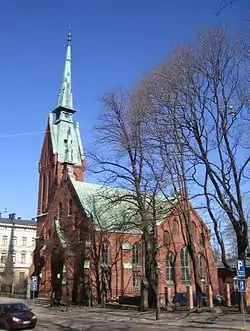Harald Julius von Bosse
Harald Julius von Bosse (28 September 1812 – 10 March 1894; Гаральд Юлиус Боссе) was a 19th-century architect and painter. He was descended from a Germano-Baltic noble family and was a subject of the Russian Empire.

Life
He was born in Lievburg nearby Saint Petersburg. He studied at Darmstadt and moved to Saint Petersburg in 1831. He worked in Alexander Brullov's studio and was made a free painter in the Imperial Academy of Arts in 1832, an academician there in 1839 and a professor there in 1854. He designed public buildings and became court architect in 1858. He retired in 1863 and moved to Dresden for health reasons, spending his final years there and in 1872 designing its Reformed Church and Russian Orthodox Church. Among his other well-known works is the German Church in Helsinki, Finland, a work attributed jointly to von Bosse and Swedish-born architect Carl Johan von Heideken, the work being completed in 1864. He died in Dresden.